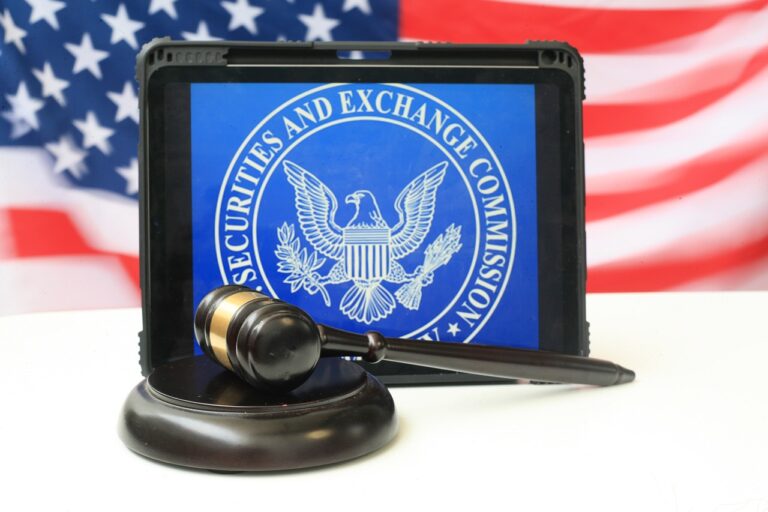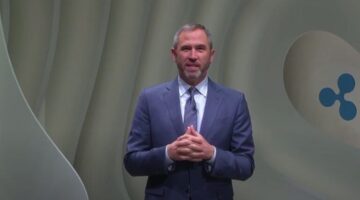
Bill Morgan, an Australian-based attorney specializing in cryptocurrency law, recently commented on the Securities and Exchange Commission’s (SEC) ongoing involvement in the crypto sector.
SEC’s Fight Against Ripple and XRP
On 13 July 2023, U.S. District Judge Analisa Torres, presiding over the Southern District of New York, delivered a nuanced verdict in the legal battle between the SEC and Ripple Labs. The lawsuit, which began in December 2020, charged Ripple Labs and its senior leaders, Bradley Garlinghouse and Christian A. Larsen, with the unauthorized issuance and sale of unregistered securities, specifically referring to XRP tokens. This was alleged to be in violation of Section 5 of the Securities Act of 1933. Garlinghouse and Larsen were also implicated for contributing to these infractions.
Both the SEC and Ripple Labs filed motions for summary judgment, leading to a split decision from the court. The SEC’s request for summary judgment was approved solely for the aspect concerning Institutional Sales while being rejected for other issues. Conversely, Ripple’s summary judgment motion received approval for Programmatic Sales, Other Distributions, and transactions conducted by Larsen and Garlinghouse, but was turned down with respect to Institutional Sales. Importantly, the SEC’s motion for summary judgment on the aiding and abetting claims against Larsen and Garlinghouse was outright denied.
Judge Torres provided further details, explaining that the XRP sales by Larsen and Garlinghouse were conducted programmatically and carried out through anonymous bid/ask trades on digital asset platforms. She asserted that these sales did not meet the criteria to be labeled as investment contracts under the Howey Test. She also specified that XRP, in its capacity as a digital token, did not inherently satisfy the Howey Test’s conditions for being an investment contract. Moreover, she observed that secondary market sales of XRP could not be categorized as investment contracts, as the proceeds from these sales were not directly linked to Ripple.
SEC’s Fight Against NFTs
On 13 September 2023, the U.S. Securities and Exchange Commission (SEC) charged Stoner Cats 2 LLC (SC2) for allegedly conducting an unregistered offering of crypto asset securities in the form of Non-Fungible Tokens (NFTs). The NFTs were designed to fund an animated web series called “Stoner Cats” and were sold at approximately $800 each. The offering, which took place on 27 July 2021, raised around $8 million in just 35 minutes. The SEC noted that the rapid sales indicated strong investor interest, likely driven by SC2’s marketing tactics.
The SEC highlighted that SC2’s marketing campaign emphasized various benefits of owning the Stoner Cats NFTs, including the ability to resell them on secondary markets. The SEC also pointed out that SC2 had configured the NFTs to provide the company with a 2.5% royalty for each secondary market transaction, encouraging further buying and selling. This resulted in more than $20 million spent in at least 10,000 transactions.
<!–
–> <!–
–>
The SEC concluded that SC2 violated the Securities Act of 1933 by not registering the offering or qualifying for an exemption. The company agreed to a cease-and-desist order and will pay a $1 million civil penalty. A Fair Fund will also be established to return money to affected investors, and SC2 has agreed to destroy all NFTs in its possession or control.
How SEC’s Attack on XRP Affects Other Altcoins
On the day that the SEC announced it had charged the creators of the “Stoner Cats” NFTs, crypto lawyer Bill Morgan pointed out that although such settlements do not establish legal precedents, they do contribute to the SEC’s increasing influence over the crypto industry. He emphasized the significance of Ripple Labs’ ongoing legal dispute with the SEC, stating that if Ripple had not taken the SEC to court, every cryptocurrency other than Bitcoin could have been automatically classified as a security by now.
On 16 September 2023, Morgan shared further thoughts on Judge Torres’ July 13th ruling.
Morgan pointed out that even though XRP was not deemed a security, the regulatory outlook for Ripple’s sales or usage of XRP remained ambiguous due to the SEC’s plans to appeal. He wondered if Ripple and its clients could feel secure from SEC oversight until the legal case and any subsequent appeals were completely settled.
Additionally, Morgan observed that it was understandable for Ripple’s Liquidity Hub to support cryptocurrencies like Bitcoin, Ether, USDC, and USDT but not XRP. He stressed that Ripple’s primary focus would be on serving its shareholders and clients rather than XRP holders. Morgan wrapped up by reiterating that Ripple is not legally bound to XRP holders, a sentiment that aligns with the court’s judgment that XRP is not a security.
Featured Image via Pixabay
- SEO Powered Content & PR Distribution. Get Amplified Today.
- PlatoData.Network Vertical Generative Ai. Empower Yourself. Access Here.
- PlatoAiStream. Web3 Intelligence. Knowledge Amplified. Access Here.
- PlatoESG. Automotive / EVs, Carbon, CleanTech, Energy, Environment, Solar, Waste Management. Access Here.
- PlatoHealth. Biotech and Clinical Trials Intelligence. Access Here.
- ChartPrime. Elevate your Trading Game with ChartPrime. Access Here.
- BlockOffsets. Modernizing Environmental Offset Ownership. Access Here.
- Source: https://www.cryptoglobe.com/latest/2023/09/ripples-sec-battle-saved-altcoins-from-security-label-says-attorney-bill-morgan/
- :has
- :is
- :not
- $1 million
- $UP
- 000
- 10
- 13
- 16
- 1933
- 2020
- 2021
- 2023
- 27
- 7
- 8
- 9
- a
- ability
- Act
- add
- Ads
- against
- agreed
- Aligns
- All
- alleged
- allegedly
- also
- Altcoins
- Although
- amongst
- an
- Analisa Torres
- and
- announced
- Anonymous
- any
- appeal
- appeals
- approval
- approved
- approximately
- ARE
- around
- AS
- aspect
- asset
- At
- attack
- attorney
- automatically
- Battle
- BE
- been
- began
- being
- benefits
- between
- Bill
- Bitcoin
- Bound
- but
- Buying
- by
- called
- Campaign
- Capacity
- carried
- case
- Cats
- charged
- civil
- claims
- classified
- clients
- commented
- commission
- company
- completely
- concluded
- conditions
- conducted
- conducting
- configured
- contract
- contracts
- contribute
- contributing
- control
- conversely
- could
- Court
- create
- creators
- criteria
- crypto
- crypto asset
- Crypto Industry
- Crypto Lawyer
- crypto sector
- cryptocurrencies
- cryptocurrency
- Cryptocurrency Law
- CryptoGlobe
- cryptos
- Customers
- day
- December
- decision
- deemed
- Default
- delivered
- demands
- denied
- designed
- destroy
- details
- DID
- digital
- Digital Asset
- Digital token
- directly
- Dispute
- distributions
- district
- do
- does
- down
- driven
- due
- each
- emphasized
- encouraging
- establish
- established
- Ether
- Even
- Every
- exchange
- expect
- explaining
- facilitate
- fair
- feel
- fight
- filed
- Focus
- For
- form
- from
- fund
- further
- Garlinghouse
- given
- good
- had
- Have
- he
- help
- Highlighted
- holders
- Howey
- Howey Test
- HTTPS
- Hub
- if
- image
- imagine
- in
- Including
- increasing
- indicated
- industry
- influence
- inherently
- Institutional
- interest
- into
- investment
- investor
- Investors
- involvement
- issuance
- issues
- IT
- ITS
- itself
- jpg
- judge
- July
- just
- Labs
- Law
- lawsuit
- lawyer
- leaders
- leading
- least
- Legal
- legally
- like
- likely
- linked
- Liquid
- Liquidity
- LLC
- Market
- Marketing
- Markets
- Meet
- million
- Minutes
- money
- more
- Moreover
- Morgan
- most
- motion
- motions
- needs
- New
- New York
- NFTs
- no
- non-fungible
- non-fungible tokens
- NON-FUNGIBLE TOKENS (NFTS)
- noted
- now
- of
- offering
- on
- ONE
- ongoing
- or
- order
- Other
- out
- Outlook
- outright
- over
- Oversight
- Pay
- Place
- plans
- Platforms
- plato
- Plato Data Intelligence
- PlatoData
- possession
- potentially
- Precedent
- primary
- proceeds
- programmatic
- provide
- provided
- qualifying
- raised
- rapid
- rather
- received
- recently
- registering
- Regulation
- regulatory
- reiterating
- Rejected..
- remained
- request
- resell
- respect
- responsive
- return
- return money
- Ripple
- ripple labs
- royalty
- ruling
- s
- sale
- sales
- Screen
- screens
- SEC
- secondary
- Secondary Market
- Secondary Markets
- Section
- sector
- secure
- Securities
- Securities and Exchange Commission
- security
- Selling
- senior
- sentiment
- September
- Series
- serving
- Settled
- Settlements
- shared
- Shareholders
- she
- significance
- sizes
- sold
- solely
- Southern
- Southern District of New York
- specializing
- specifically
- specified
- spent
- split
- stating
- strong
- subsequent
- such
- SUMMARY
- support
- surprising
- tactics
- taken
- test
- than
- that
- The
- Them
- There.
- These
- they
- this
- though?
- Through
- to
- token
- Tokens
- took
- trades
- transaction
- Transactions
- true
- Turned
- u.s.
- U.S. Securities
- U.S. Securities and Exchange Commission
- unauthorized
- under
- understandable
- unregistered
- unregistered securities
- until
- Usage
- USDC
- USDT
- use
- various
- Verdict
- violated
- VIOLATION
- was
- web
- were
- which
- while
- will
- with
- would
- Wrapped
- xrp
- xrp holders
- york
- zephyrnet













